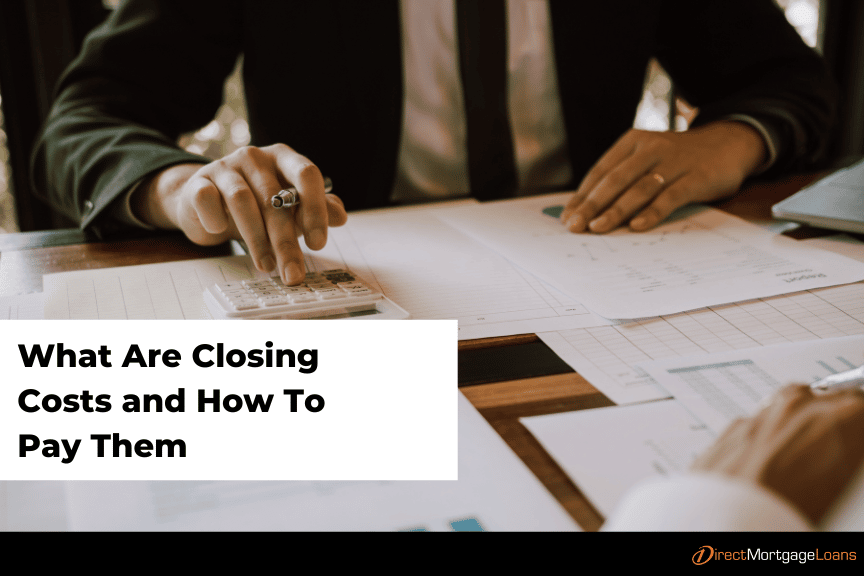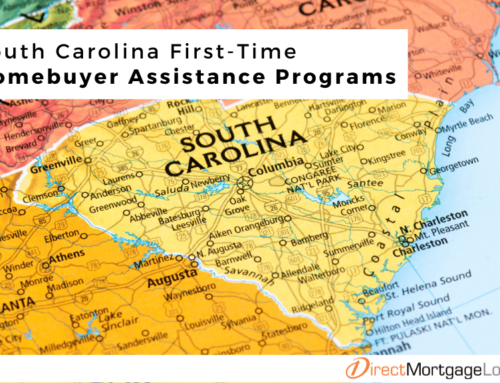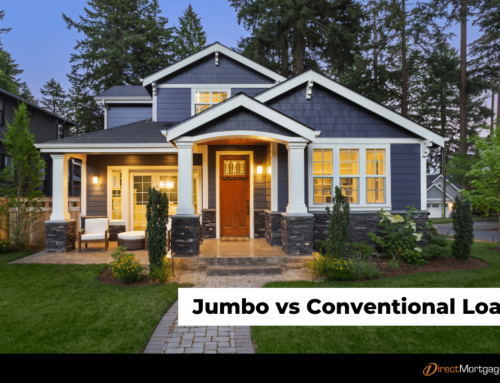If you’re planning to purchase a home, then most likely you’ll incur some type of closing costs. Closing costs are the fees and expenses that are paid at the closing of a real estate transaction. While you create a plan for your mortgage process, you’ll want to increase your knowledge of these costs to prepare yourself for closing day. Below we have outlined everything you need to know about closing costs on a mortgage so you can plan accordingly!
Subscribe to our blog to receive notifications of posts that interest you!
What are closing costs on a mortgage?
Mortgage closing costs are the fees that are charged when you buy or sell a property. These fees may include all third-party fees incurred during the mortgage process (title search fees, home appraisal fees, lender fees, attorney fees, etc.) which will be itemized on your loan estimate and closing disclosure. Closing costs can also include taxes and insurance premiums. The amount of your closing costs will depend on a number of factors, such as the price of the property, the type of loan you have, and the location of the property. In general, closing costs can range from 2% to 5% of the purchase price of the property.
What is the purpose of a closing disclosure?
A closing disclosure is a document that outlines the final terms and costs of your mortgage loan and will itemize closing costs. It is a crucial part of the homebuying process and serves several important purposes. This will also detail who pays and receives money at the closing table. Your closing disclosure will be accessible to you 3 business days before settlement. It is crucial that you review this document thoroughly. Compare it to your loan estimate, sign, and return it in a timely manner.
Download our Closing Day Fees Checklist!
Why are closing costs important?
Closing costs are an important part of the home buying or selling process. They can add up to thousands of dollars, and it is essential to understand them to avoid any surprises. Understanding the closing costs can help buyers and sellers budget for them and negotiate them with the other party.
How much are the closing costs on a mortgage?
The cost of closing on a home can vary depending on several factors such as the state and county where the property is located, the type of property being purchased, and the price of the property.
Closing costs can typically range from 2% to 5% of the total purchase price of the home. For example, if you’re buying a $250,000 home, you can expect to pay anywhere from $5,000 to $12,500 in closing costs.
Who pays closing costs?
Closing costs are an essential part of any real estate transaction, but who pays for them can often be a point of negotiation between the buyer and the seller. In general, both the buyer and the seller will be responsible for paying some of the closing costs. The exact costs and how they are divided can vary depending on the terms of the contract and local laws. It’s important to note that the specific closing costs and how they are divided can vary from state to state and may be subject to negotiation between the buyer and seller.
Buyers may be able to negotiate with the seller to have them pay for some or all the closing costs as part of the seller concessions. Similarly, sellers may be able to negotiate to have the buyer pay for a larger share of the closing costs.
What is included in closing cost?
Closing costs are calculated based on a variety of factors. Some of the most common expenses that are included in closing costs are:
Appraisal Fee
This fee covers the cost of having a professional appraiser evaluate the property to determine its fair market value. The buyer will have to pay for this at closing.
Escrow Fee
An escrow is a third party that holds and controls money and assets. This is until all parties involved in the transaction meet certain requirements/ conditions. Having an escrow account ensures that you pay your property tax and homeowners insurance bills on time, automatically.
Home Inspection Fees
These fees cover the cost of having a professional inspector evaluate the property for any issues, such as structural problems or termite damage.
Property Taxes
Start at the date of closing and continue throughout the year.
Application Fee
This fee covers the costs of reviewing and processing the loan application. Application fees are typically NOT refundable even if you do not get approval for the loan.
Loan Origination Fee
The loan origination fee is designed to account for the expenses associated with processing and underwriting your loan. Typically, you can anticipate paying approximately 1% of your loan’s total value in origination fees. This fee, along with mortgage discount points, will be included in the origination charges section of your loan estimate.
Lenders may offer the option for you to make an upfront payment on your loan, which allows you to lower your interest rate by purchasing discount points.
Underwriting Fee
This fee covers the cost of evaluating the borrower’s creditworthiness and risk level.
Credit Report Fee
This fee covers the cost of obtaining a copy of the borrower’s credit report.
Title Search Fee
This fee covers the cost of verifying the property’s title. The title search company will research the property’s history and area to give the “go” for the loan.
Homeowners Insurance
Sometimes the homeowner’s insurance will require you to pay on closing day.
Attorney Fees
If you have an attorney represent you during the closing process, you’ll need to pay their fees.
Recording Fees
These fees cover the cost of recording the sale with the local government. This covers the cost of recording the mortgage and other legal documents with the appropriate government agency.
Transfer Taxes
Some states and municipalities require that you pay a transfer tax when you sell a property.
These fees can vary depending on the type of loan, and borrowers should carefully review the loan estimate and closing disclosure to understand the full extent of the fees and charges associated with the loan.
How to Pay for Closing Costs
There are a few different ways to pay closing costs. In general, you’ll need to have the funds available at the time of closing. Some of the most common ways to pay closing costs include:
Pay From Your Personal Checking or Savings Account
If you have the funds to do so, then you can use your checking or savings account to pay costs at closing. Just remember, these funds must be in your account for at least 60 days, before being able to use these for closing costs.
Roll It Into Your Mortgage
Depending on the loan, you can add closing costs into your mortgage loan. This is a great option for buyers low on cash but be aware that you will pay interest on this amount over the years.
Ask for Seller Credit
Conventional, FHA, USDA, and VA loans allow the option to ask the seller to cover part, or all the closing costs. This method is most common in a buyer’s market where the seller may not be receiving many offers.
Use Gift Funds from Family
Your parents, relatives, or significant others can contribute to your closing costs with a gift fund. If you plan to use a gift fund toward the purchase of your next home, then be sure to communicate with your loan officer to have the money sent directly to your escrow account.
Download our FREE gift fund guide today!
Apply for Down Payment Assistance Programs
Many state and local government agencies offer down payment assistance programs that can help cover the costs of both the down payment and closing costs. These programs typically provide grants to eligible borrowers. *
What to do immediately after buying a house?
After you’ve closed on your house, there are several important tasks you should take care of to ensure a smooth transition into your new home.
- Get copies of all documents: Make sure to get copies of all documents related to your home purchase, including the loan documents and closing disclosure. These documents will be important for tax purposes and future reference.
- Change the locks: For added security, consider changing the locks on all exterior doors of your new home. This will ensure that you’re the only one with access to your property.
- Update Your Driver’s License: Most states require you to update your address within 30 days of your move. We recommend setting a calendar reminder to follow up with your state’s MVA two weeks after closing. This will give you time to settle into your new home beforehand.
- Update Utilities: Make sure to set up utilities, including water, electricity, gas, and internet, in your name before closing, with the transfer/start date set as your closing date. This will ensure no lapse in service.
- Forward Your Mail: Visit www.usps.com to update your address and set up forward mailing. You’ll want to update ASAP to ensure you don’t miss important mail.
- Update Your Address: Think about the businesses who have your old address on record (employers, banks, credit card companies, etc.). You’ll need to update your contact information with each business. This will help ensure that you receive all important mail and correspondence. Thankfully, most of the changes can be completed online!
- File for Tax Exemptions: Don’t forget to file your tax exemption 30 days after closing. This is important to control your property taxes.
Connect With A Direct Mortgage Lender To Learn More
Frequently Asked Questions About Closing Costs
Can you negotiate closing costs?
Yes, you can negotiate closing costs with the seller. In some cases, the seller may be willing to pay some or all the closing costs.
How much should you budget for closing costs?
You should budget for closing costs based on the purchase price of the property and the type of loan you have. In general, closing costs can range from 2% to 5% of the purchase price of the property.
When do you pay closing costs?
Closing costs are typically paid at the closing of a real estate transaction, which is the final step in the buying or selling process where the title to the property is transferred from the seller to the buyer.
While closing on a home may seem a bit chaotic, we will be here to help you every step of the way.
Can you put closing cost in mortgage?
You can include closing costs in your mortgage, a process known as “rolling.” This means you add these costs to your home loan rather than paying them upfront. While this could make buying a home more affordable initially, it comes with some trade-offs. By financing closing costs, you’ll pay interest on them over the life of your mortgage, potentially increasing your overall cost.
Moreover, it may affect your eligibility for the loan and your loan-to-value ratio. Carefully weigh the advantages of reduced upfront expenses against the long-term cost of interest and consult your mortgage lender to make an informed decision that aligns with your financial goals.
*Eligibility and approval is subject to completion of an application and verification of home ownership, occupancy, title, income, employment, credit, home value, collateral and underwriting requirements. Direct Mortgage Loans, LLC NMLS ID# is 832799 (www.nmlsconsumeraccess.org). Direct Mortgage Loans, LLC office is located at 11011 McCormick Rd Suite 400 Hunt Valley, MD 21031. Equal housing lender.*






Leave A Comment
You must be logged in to post a comment.